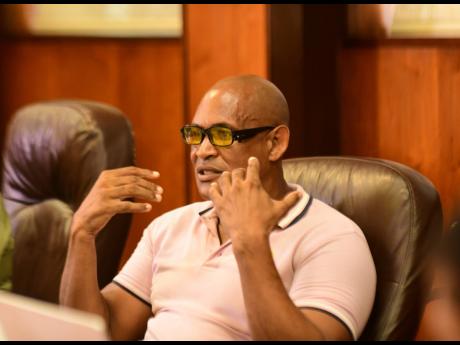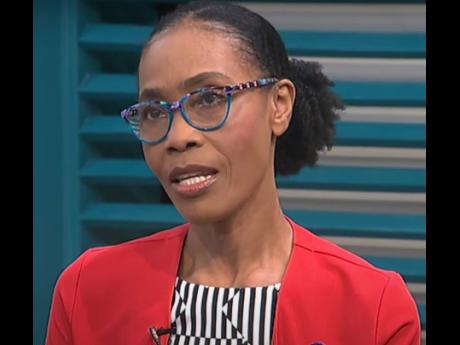Underage gambling dilemma
- Risky high-stakes games on the increase in schools and churches - Teenage girls using bets to engage in explicit sex acts
They often start off in primary school playing ‘bum pon wall’, a game of chance and skill in which rubber bands are used. But by the time they reach high school, some of these students have already mastered the art of gambling with cards, dice,...
They often start off in primary school playing ‘bum pon wall’, a game of chance and skill in which rubber bands are used. But by the time they reach high school, some of these students have already mastered the art of gambling with cards, dice, dominoes and other games; skilled in the fundamentals of high-stakes betting.
In their world, however, high stakes do not always involve money. In many instances, these students gamble for anything they consider of value – from pieces of clothing or jewellery, to truth or dare to commit explicit sexual acts that could have lifelong implications.
These high-stakes games are often at the root of some violent clashes between students, some of which have led to the deaths or serious injury of students in the island’s classrooms, educators shared with The Sunday Gleaner last week.
The extent of the problem has forced administrators to call in outside intervention, or in at least one instance, expel the offending students.
“This gambling issue is widespread, among males and females. Years ago, you would have seen it just among the boys, but now you are seeing it equally among the girls and sometimes more,” stressed Angelica Dalrymple, president of Jamaica Association of Guidance Counsellors in Education.
“These students are very creative. These games they play are never boring and they are so slick. When you do catch them in the act, you would be surprised by some of the things they are doing,” offered the senior guidance counsellor, explaining that, unlike male students, girls find value in far more things than money.
Among the devastating consequences of underage gambling, Dalrymple noted, are risky behaviours that can have long-term consequences, truancy, interruption of studies, and serious conflicts, especially when one participant feels they were robbed, refuses to pay up, or believes they may come under threat from the other.
CAUGHT COMMITTING SEXUAL ACTS
Dalrymple shied away from citing any particular school or incident, but the principal of one high school in the western end of the island told The Sunday Gleaner that the school board was forced to expel five students earlier this year after their gambling habits, and spin-off conflicts, threatened the safety and learning of the school population.
“We have had an increase in incidents of gambling or the placing of some wager on bets, especially since the [COVID-19] pandemic. Sometimes, I understand, it can be truth or dare with sexual favours for payment,” the principal told The Sunday Gleaner, asking not to be named in order to protect the school and the students.
“Several times, this group of students had been caught committing sexual acts, which we later learn was because of a bet. There was also an increase in girls with same-sex tendencies daring other females to kiss each other. Since that gang of five left, however, things have calmed down because others got the message.”
“It broke my heart to make the decision (expulsion) that I did, but it was necessary to sacrifice a few in order to try and save the rest,” the principal said, pointing to a breakdown of standards in a society constantly exposed to illicit materials and erotic behaviour.
IN THE CHURCHES, TOO
The concerning behaviour among youth is not just limited to the schools. Earlier this year, the leaders of a church had to seek the aid of psychologists for intervention and counselling for a group of teenage girls. One of the girls had taken a bet to perform oral sex on a boy, a recording of which ended up on social media.
The church was also facing instances where teenage girls had dared to enter into relationships with much older men.
“They have some private social media accounts that only they know and unless you have other children around who can bring your attention to it as an adult, you would never know,” the pastor explained to The Sunday Gleaner.
“Most of this is happening to the young women who are devaluing themselves and getting involved in all sorts of lesbian and promiscuous acts,” the pastor added, also asking for anonymity for fear that it would paint a bad picture of his church.
STAKES MUCH HIGHER TODAY
In years gone by, underage gambling was seen as a means to provide for economic needs, educators argued. In today’s society, however, that’s not so much the case, with things like drugs such as ganja cakes and candies popping up as wagers. Jewellery is also a commonly used bargaining chip, but the culture and context of the school often dictate the items of value, Dalrymple explained.
Oftentimes it is only after high-end items are gambled away or money is stolen that parents become aware of these wagers, sometimes visiting the schools to demand the return of items that were lost in gambling sprees by their children.
DESIRE TO PLEASE PEERS
Counsellors have noted that personal internal conflicts and a desire to please their peers were among the reasons shared in counselling sessions by the students.
Feeling a sense of accomplishment from winning a game or from winning or successfully fulfilling a bet is a recurring theme, such as in the case of Tamaya*, one of the church girls implicated in the unholy social media video.
“To tell you the truth, I don’t even know why I get involved in these things, and I am always the one getting into trouble,” one counsellor said a female 10th grader offered during one counselling session.
“At one point, I think it was because I felt nobody cared about me, but as soon as they started paying attention to me, I messed up the friendship with another fool-fool decision.”
NEW STUDY NEEDED
Each month, RISE Life Management Services receives an average of four calls from various schools, particularly secondary level, for assistance with children who have gambling challenges, and since April, 132 student interventions have been carried out by the NGO.
With one of its core functions being the prevention and treatment of addictive disorders, RISE serves schools across the island.
From April 22 to March this year, 23,027 students were sensitised; 66 schools were impacted, of which 41 per cent were high schools; and 158 students were given specialised interventions. There we also 14 community-based events by RISE.
Most of the requests for intervention come from Corporate Area schools, Richard Henry, head of Gambling Counselling and Support Services at RISE, told The Sunday Gleaner.
He also noted that some students are repeat offenders who intervention officers have had to give particular attention to, which is outside the usual wholesale sensitisation sessions with schools.
“You can’t force young people to make decisions about their lives. You have to give them information. The aim is to give them enough information that they can make a sustained decision,” Henry charged, emphasising that studies have shown that the earlier the onset of gambling, is the likelihood of it becoming addictive in adulthood.
“There are children who really need to have specialised intervention and the frustration is that the schools really want to help,” he said, adding that most schools attempt rehabilitation instead of punitive measures with regard to gambling. “We are trying to keep children who are not gambling, which is the majority, from gambling.”
The increasing prevalence of underage gambling has prompted RISE to now conduct a new study into the problem as it acknowledges a need for a more targeted and data-driven approach.
Funded by the Betting, Gaming and Lotteries Commission (BGLC), the study is expected to be completed later this year.
The first and only study done on underage gambling in Jamaica was in 2007, and thus is dated.
The last week of September was celebrated as Underage Gambling Prevention Week, and according to Henry, several initiatives were undertaken in the period.
PROBLEMS MUCH BIGGER THAN LESSON PLANS
In addition to training some 319 guidance counsellors, RISE has also launched an ‘Underage Gambling Prevention Education Lesson Plans to Sensitize and Develop Awareness among Youths’ booklet. RISE plans to distribute these to guidance counsellors to better enable them to deal with gambling challenges in schools.
However, the head of the Jamaica Association of Guidance Counsellors in Education believes the problems are much bigger than lesson plans.
While Jamaica’s high school guidance counsellors have the will and knowledge to tackle the issue, there are not enough of them in the schools to provide timely and direct interaction with individual students, some of whom require continual support, Dalrymple noted.
“Guidance counsellors have the capacity, potential, and training to deal with the challenge but they just cannot do it in the Jamaican context because of the number of students,” she said.
“The guidance counsellors don’t have the leverage to really focus when you have 200 students with these behaviours to one guidance counsellor in a school.”
Dalrymple stressed, “The Ministry of Education is not really adhering to our cries when we say that we cannot manage. One counsellor sometimes has up to 700/800 students, and it is that person alone.”



